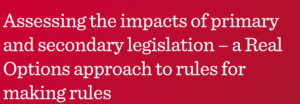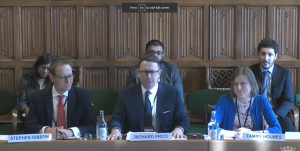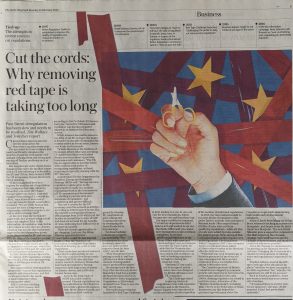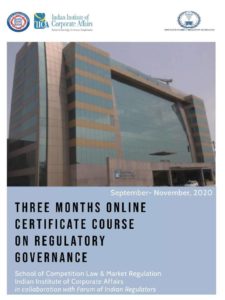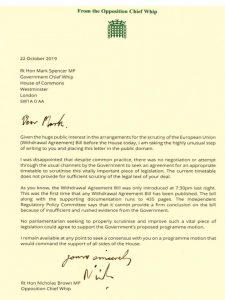Watch out for Stephen Gibson’s latest appearances on TV, Radio and in the Press
12 February 2025 Stephen Gibson gives guest lecture on MIT PhD course in regulation
Stephen Gibson was invited by Professor Nancy Rose to give a special guest lecture on the PhD course in regulation at the Massachusetts Institute of Technology. Unlike in the UK, PhD students at MIT spend their first 2 years completing a series of core courses before spending up to a further 6 years researching and writing their thesis.
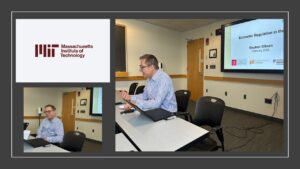 Stephen’s lecture discussed UK economic regulation from its origins in the 17th and 18th Century Acts of Parliament that regulated the charges for toll roads and canals, right through to the principles for regulating Artificial Intelligence.
Stephen’s lecture discussed UK economic regulation from its origins in the 17th and 18th Century Acts of Parliament that regulated the charges for toll roads and canals, right through to the principles for regulating Artificial Intelligence.
February 2025 Stephen Gibson interviewed in Economic Review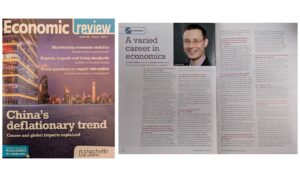
Stephen Gibson was interviewed by Professor Caroline Elliot in the February edition of the Economic Review. He discussed his career path and motivations for being an economist.
10th February 2025 Stephen Gibson and Lord Dominic Johnson address Harvard’s JFK Forum
Stephen Gibson and Lord Dominic Johnson of Lainston (the former Minister for Regulatory Reform) addressed a packed audience at Harvard Kennedy School’s JFK Forum at an event sponsored jointly by the HKS Institute of Politics and the HKS School of Business and Government. The topic was: ‘Can DOGE can really reduce Government regulation? Lessons from the UK’. 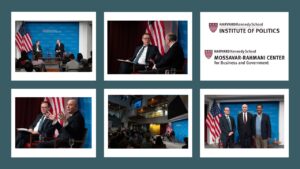
The speakers discussed the huge £25bn increase in UK regulatory costs between 2017 and 2023, despite the Government’s target to reduce those costs by £9bn and why it was so difficult for governments to reduce regulatory burdens. They also considered the Cameron government’s One-In-One-Out policy (later to become One-In-Two-Out and One-In-Three-Out) which meant that no new regulation could be introduced without a existing regulation of equal value being repealed – particularly relevant in the light of President Trump’s recent Executive Order to require 10 regulations to be removed for each new rule that is introduced.
Stephen Gibson and Lord Johnson spoke about the unintended consequences of heavy-handed regulation that increases the cost of doing business and weighs down businesses – particularly small and micro businesses. This ‘sludge’ of onerous rules, overly-complicated government forms, slow response times, compliance requirements and planning regulations make it more difficult for businesses to raise new capital, innovate and bring goods to market. They discussed whether Elon Musk will avoid ‘throwing the baby out with the bathwater’ in terms of drastically cutting regulation without removing important consumer protections or safety regulations.
A full recording of the Forum is available at https://www.youtube.com/watch?v=IQPEo-rbnis&t=638s.
1st December 2024 Announcement about publication of Regulatory Governance book
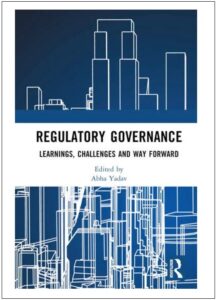 Stephen Gibson’s paper on The Role of Regulatory Impact Assessments in the UK is being published as a chapter in a book on Regulatory Governance edited by Dr. Abha Yadav.
Stephen Gibson’s paper on The Role of Regulatory Impact Assessments in the UK is being published as a chapter in a book on Regulatory Governance edited by Dr. Abha Yadav.
This book explores the role of regulatory bodies and their emergence as the fourth branch of governments. It It examines a range of themes including, the need for regulatory policy in a post-Covid world, regulatory excellence, impact of regulatory assessments, regulation of hazard, competition commissions, regulation of digital assets, stakeholder interests and investor activism, and anti-trust laws.
It will be available from 1 April 2025 from this link
13th November 2024 Stephen Gibson interviewed by RegWatchEurope
Stephen Gibson was interviewed by RegWatchEurope (the association of European independent regulatory scrutiny bodies) about the role of the Regulatory Policy Committee and the revisions to the Better Regulation Framework in the UK. The interview is available at this link
30th July 2024 Stephen Gibson appointed to Bank of England Cost-Benefit Analysis panel
 Stephen Gibson has been chosen to be a member of the Bank of England’s new Cost Benefit Analysis (CBA) panel. The CBA Panel will provide advice on the preparation of cost benefit analysis when the Prudential Regulation Authority (PRA) and Bank propose new rules or amend existing rules for firms and financial market infrastructures. The CBA Panel may also provide recommendations for how the PRA and the Bank can improve their overall methodology and approach to cost benefit analysis. Further details of the panel’s work are available here.
Stephen Gibson has been chosen to be a member of the Bank of England’s new Cost Benefit Analysis (CBA) panel. The CBA Panel will provide advice on the preparation of cost benefit analysis when the Prudential Regulation Authority (PRA) and Bank propose new rules or amend existing rules for firms and financial market infrastructures. The CBA Panel may also provide recommendations for how the PRA and the Bank can improve their overall methodology and approach to cost benefit analysis. Further details of the panel’s work are available here.
22nd July 2024 Keynote address at Australia and New Zealand Regulatory Reform annual meeting
Stephen Gibson gave the keynote address (virtually) at the Australia and New Zealand Regulatory Reform annual meeting in Brisbane, Australia which was organised by the Queensland Treasury.
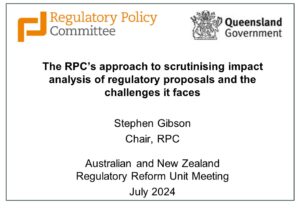 Stephen spoke about how regulatory scrutiny operates in the UK, some of the challenges we have faced in attempting to reduce the burden that regulation places on business, and our efforts to increase the quality of Impact Assessments. He also outlined the work that the Regulatory Policy Committee does to build and support analytical capacity across government.
Stephen spoke about how regulatory scrutiny operates in the UK, some of the challenges we have faced in attempting to reduce the burden that regulation places on business, and our efforts to increase the quality of Impact Assessments. He also outlined the work that the Regulatory Policy Committee does to build and support analytical capacity across government.
16th June 2024 Keynote address at International Association on Regulation and Governance
 Stephen Gibson gave the keynote address at the inaugural conference of the University of Pennsylvania Carey Law School International Association on Regulation and Governance, speaking alongside the Honourable Ricky Revesz, Chair of OIRA (Office of Information and Regulatory Affairs – the equivalent of the RPC in the USA) and Professor Valerie Braithwaite from the Australian National University.
Stephen Gibson gave the keynote address at the inaugural conference of the University of Pennsylvania Carey Law School International Association on Regulation and Governance, speaking alongside the Honourable Ricky Revesz, Chair of OIRA (Office of Information and Regulatory Affairs – the equivalent of the RPC in the USA) and Professor Valerie Braithwaite from the Australian National University.
Stephen also gave a separate presentation on regulatory evaluation – summarising the messages in his recently published paper.
14 June 2024 Discussant at Centre for Competition Policy Annual Conference
 Stephen Gibson was the discussant for a panel debate on regulatory approaches to equity at the University of East Anglia Centre for Competition Policy Annual Conference in Canary Wharf. He spoke about the fact that equity is often the ‘poor relation’ of efficiency when it comes to assessing regulations, because of the difficulty in valuing reductions in inequality. While there is a well-developed approach to trading off benefits between future customers and
Stephen Gibson was the discussant for a panel debate on regulatory approaches to equity at the University of East Anglia Centre for Competition Policy Annual Conference in Canary Wharf. He spoke about the fact that equity is often the ‘poor relation’ of efficiency when it comes to assessing regulations, because of the difficulty in valuing reductions in inequality. While there is a well-developed approach to trading off benefits between future customers and  current customers (HMT Green Book standard rules on discounting), no such approach exists for valuing redistributive measures that trade-off between wealthy and poorer customers. This is something that government and regulators should think about in their approach to regulatory decision-making in future.
current customers (HMT Green Book standard rules on discounting), no such approach exists for valuing redistributive measures that trade-off between wealthy and poorer customers. This is something that government and regulators should think about in their approach to regulatory decision-making in future.
30 May 2024 Interview with Will Bain on Radio 5’s Wake Up To Money programme
 Stephen Gibson was interviewed by Will Bain about the proposed £5bn take over of Royal Mail by Czech businessman Daniel Kretinsky on Radio 5’s Wake Up To Money programme. Stephen explained some of the challenges facing Royal Mail including: the decline in the number of letters being sent (down by a half since 2011), the postal universal service obligation (USO) which requires Royal Mail to deliver 6 days per week to every address in the country at a uniform price, and also the difficulty of removing costs in a labour-intensive, highly-unionised business.
Stephen Gibson was interviewed by Will Bain about the proposed £5bn take over of Royal Mail by Czech businessman Daniel Kretinsky on Radio 5’s Wake Up To Money programme. Stephen explained some of the challenges facing Royal Mail including: the decline in the number of letters being sent (down by a half since 2011), the postal universal service obligation (USO) which requires Royal Mail to deliver 6 days per week to every address in the country at a uniform price, and also the difficulty of removing costs in a labour-intensive, highly-unionised business.
On the other hand Royal Mail’s parent company (IDS) also owns GLS, a highly profitable international parcels and logistics business, which Mr Kretinsky would be eager to get his hands on.
While the deal is not yet concluded (it needs to be voted on by shareholders at IDS’s Annual General Meeting in September), the bigger question is whether politicians will take the risk of allowing the takeover when the guarantees being offered to preserve the USO only last for 5 years.
You can hear a recording of the interview here (at 28:30).
15 May 2024: Independent Commission on UK Public Health Emergency Powers quotes evidence from Stephen Gibson in its report
Last year, Stephen Gibson gave evidence to the Independent Commission on UK Public Health Emergency Powers about the Government’s approach to regulation during Covid. The ICUKPHEP has published their final report reviewing the emergency public health laws and parliamentary procedures associated with the Covid-19 pandemic.
 The report quotes Stephen’s evidence (Paragraphs 149-151) about the exemption of Covid-related regulations from the Better Regulation Framework and makes an important recommendation that : “As a matter of best practice, governments should set out the anticipated impact of regulations made using the made affirmative procedure before any parliamentary approval debate takes place. Where this is not possible, if any provision within the made affirmative regulations is to be continued in substantially the same form beyond the original two month sunset period, then an impact evaluation should be provided to the legislature in advance of the subsequent approval debate.“
The report quotes Stephen’s evidence (Paragraphs 149-151) about the exemption of Covid-related regulations from the Better Regulation Framework and makes an important recommendation that : “As a matter of best practice, governments should set out the anticipated impact of regulations made using the made affirmative procedure before any parliamentary approval debate takes place. Where this is not possible, if any provision within the made affirmative regulations is to be continued in substantially the same form beyond the original two month sunset period, then an impact evaluation should be provided to the legislature in advance of the subsequent approval debate.“
7 March 2024 – Institute of Regulation annual conference
 Stephen Gibson was a member of the expert panel discussing How might we ensure regulators provide greater accountability and transparency to government? at the Institute of Regulation’s annual conference held at BMA House in London. He spoke alongside Paul Arnold MBE (Information Commissioner’s Office), Emily Miles (Food Standards Agency) and Charles Nancarrow (National Audit Office), discussing the House of Lords report Who Watches the Watchdogs? and the new Better Regulation Framework.
Stephen Gibson was a member of the expert panel discussing How might we ensure regulators provide greater accountability and transparency to government? at the Institute of Regulation’s annual conference held at BMA House in London. He spoke alongside Paul Arnold MBE (Information Commissioner’s Office), Emily Miles (Food Standards Agency) and Charles Nancarrow (National Audit Office), discussing the House of Lords report Who Watches the Watchdogs? and the new Better Regulation Framework.
14-15 February 2024 – February Harvard Kennedy School Senior Fellows Meeting
 Stephen Gibson attended the September meeting of the Senior Fellows programme in the Mossavar-Rahmani Center for Business and Government at the Harvard Kennedy School. He discussed with the other Senior Fellows and distinguished Harvard Professors Richard Zeckhauser, William Hogan and John Haigh his plans for the next steps of his research project, building on the work he has already completed.
Stephen Gibson attended the September meeting of the Senior Fellows programme in the Mossavar-Rahmani Center for Business and Government at the Harvard Kennedy School. He discussed with the other Senior Fellows and distinguished Harvard Professors Richard Zeckhauser, William Hogan and John Haigh his plans for the next steps of his research project, building on the work he has already completed.
2 February 2024 – Paper on Primary/Secondary Legislation and Real Options published
Stephen Gibson’s paper titled “Assessing the impacts of primary and secondary legislation – a Real Options approach to rules for making rules” (co-written with Dr Jonathan Cave from Warwick University) and with a Foreword by Rt Hon Sir Robert Buckland KBE KC MP was published as a Harvard Kennedy School Working Paper.
The paper outlines the rise in the use of Secondary legislation as a mechanism for introducing areas of policy and the implications for democratic accountability. It also examines the implications of the increased use of compound legislation for impact assessments and proposes a new approach to cost-benefit analysis based on the use of real options. This real options approach recognises that primary legislation creates the opportunity, but not the obligation to enact secondary legislation.
23 January 2024 – Evidence to Secondary Legislation Scrutiny Committee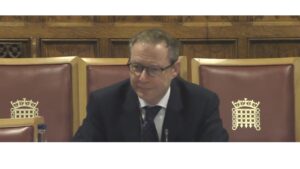 Stephen Gibson (in his role as Chair of the RPC) gave evidence to the House of Lords Secondary Legislation Scrutiny Committee (SLSC). The Committee asked Stephen a number of questions covering the RPC’s role, how it produces opinions, the transparency of the process and post implementation reviews.
Stephen Gibson (in his role as Chair of the RPC) gave evidence to the House of Lords Secondary Legislation Scrutiny Committee (SLSC). The Committee asked Stephen a number of questions covering the RPC’s role, how it produces opinions, the transparency of the process and post implementation reviews.
The full session can be viewed here
12 December 2023 – Paper on Regulatory Evaluation published
Stephen Gibson’s paper on Are regulations achieving their objectives? Post Implementation Reviews – why they should be done, why they aren’t done and how to get them done has been published by the Social Market Fo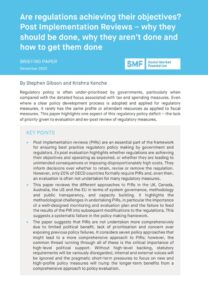 undation.
undation.
Regulatory policy is often under-prioritised by governments, particularly when compared with the detailed focus associated with tax and spending measures. Even where a clear policy development process is adopted and applied for regulatory measures, it rarely has the same profile or attendant resources as applied to fiscal measures. This paper, with a foreword by John Penrose MP, highlights one aspect of this regulatory policy deficit – the lack of priority given to evaluation and ex-post review of regulatory measures.
Thank you to the Mossavar-Rahmani Center for Business and Government at the Harvard Kennedy School for support in researching this paper.
The paper is available here
6 December 2023 – The European People’s Party Workshop on Competitiveness
Stephen Gibson was a guest speaker at the European People’s Party (EPP) workshop on competitiveness today. Together with the other speakers: Elisa Roller, Stefano Firpo and Hanno Woelm, we addressed questions around how to make regulatory processes more efficient, what are the real costs of regulation, what policies could create a more competitive environment for businesses and how to foster innovation and technological advancements. 27-29 September 2023 – September Harvard Senior Fellows meeting
27-29 September 2023 – September Harvard Senior Fellows meeting
Stephen Gibson attended the September meeting of the Senior Fellows programme in the Mossavar-Rahmani Center for Business and Government at the Harvard Kennedy School.
Stephen pr esented his paper on regulatory evaluation, which addressed the questions: Why should evaluations be done? Why are they often not done? and How to get them done? The paper was very well received and will be submitted it for publication soon.
esented his paper on regulatory evaluation, which addressed the questions: Why should evaluations be done? Why are they often not done? and How to get them done? The paper was very well received and will be submitted it for publication soon.
25 April 2023 – Study Group on Regulating the Advertising of Junk Food
Stephen Gibson ran a study group in the Harvard Kennedy School on Regulating the Advertising of Junk Food : An Economist’s Perspective. The group discussed: why we want to regulate the advertising of junk food, different policy options aimed at reducing junk food advertising, how to use cost-benefit analysis to inform the choice between the different policy options and the post implementation review of the effectiveness of advertising restrictions. 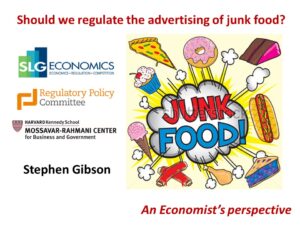
Thank you to the Mossavar-Rahmani Center for Business and Government at the Harvard Kennedy School for organising this study group.
19th April 2023 – Presentation at Regulatory Policy Institute Westminster Conference
Stephen Gibson gave a presentation on Improving Regulatory Scrutiny at the The Regulatory Policy Institute Westminster Conference. The presentation discussed and commented on the current proposals for reforming the Better Regulation Framework and was also an opportunity to present some of the results from Stephen’s paper on Reducing the Burden of Government Regulation. There was a panel discussion afterwards with Stephen, Juliet Young (Chief Economist of Ofwat) and Keith Anderson (CEO of Scottish Power).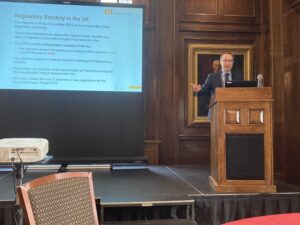
9th March 2023 – Paper on Reducing the Burden of Government Regulation published
Stephen Gibson’s paper on Reducing the Burden of Government Regulation has been published by the Social Market Foundation. It reviews the effectiveness of different approaches to reducing regulatory red tape and draws out 5 important lessons for future Government initiatives:
– The need for strong political support for initiatives to reduce regulation;
– The importance of independent validation of regulatory burden calculations;
– Ensuring significant regulations are not excluded from the framework;
– Focussing on the small number of regulations that generate most of the regulatory burdens; and
– Involving stakeholders in the process.
The Foreword from John Penrose MP says that: “The very first graph [see below] of this excellent and well-informed paper should give every policy-maker, regulator and public official a sharp pain in the chest“. The graph shows how previous measures including the Red Tape Challenge (RTC) and One-In-One-Out (OIOO) followed by One-In-Two-Out (OI2O) and OI3O managed to contain the growth of regulatory costs, while the current approach based on the Business Impact Target (BIT) has seen those costs balloon. Making announcements about ambitions to reduce regulatory costs without an ongoing commitment from Ministers to deliver on those ambitions was never going to work. It is hoped that the Government will learn the lessons from past failures to improve the Better Regulation Framework – the potential benefits of getting it right are huge.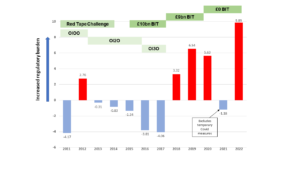 The Retained EU Law Bill currently going through Parliament risks failing to heed the lessons of past initiatives. The Bill, which will automatically scrap every piece of retained EU law that is not reviewed and retained before December 2023 is motivated by a political desire to ‘get Brexit done’. It risks removing regulations without thinking through their value and missing a ‘golden opportunity’ to properly consider the costs and benefits involved in order to improve business regulation. Extending the December deadline, providing clear guidance around the internal processes to be used to assess the retained EU regulations, together with a properly managed and resourced assessment and review programme would be a much better way forward.
The Retained EU Law Bill currently going through Parliament risks failing to heed the lessons of past initiatives. The Bill, which will automatically scrap every piece of retained EU law that is not reviewed and retained before December 2023 is motivated by a political desire to ‘get Brexit done’. It risks removing regulations without thinking through their value and missing a ‘golden opportunity’ to properly consider the costs and benefits involved in order to improve business regulation. Extending the December deadline, providing clear guidance around the internal processes to be used to assess the retained EU regulations, together with a properly managed and resourced assessment and review programme would be a much better way forward.
Stephen Gibson would like to thank the Mossavar-Rahmani Center for Business and Government at the Harvard Kennedy School for their support in developing this paper, and in particular Professors Jason Furman, Richard Zeckhauser and John Haigh. He would also like to thank the Regulatory Policy Committee for their thoughtful observations on the effectiveness of regulatory burden reduction measures.
The paper is available here
16th-18 February 2023 – Harvard Kennedy School Senior Fellows meeting
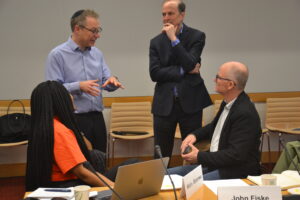 Stephen Gibson attended the February meeting of the Mossavar-Rahmani Centre for Business and Government at Harvard Kennedy School. The Senior Fellows addressed issues at the interface of the public and private sectors: regulation, corporate governance, the role of government , the challenges posed by artificial intelligence and
Stephen Gibson attended the February meeting of the Mossavar-Rahmani Centre for Business and Government at Harvard Kennedy School. The Senior Fellows addressed issues at the interface of the public and private sectors: regulation, corporate governance, the role of government , the challenges posed by artificial intelligence and  more.
more.
Stephen presented his paper on How to reduce the burden of Government Regulation? which was responded to by Prof Jason Furman, Aetna Professor of the Practice of Economic Policy.
13th February 2023 – Harvard Kennedy School Study Group: How many regulations does it take to change a lightbulb?
 Stephen Gibson together Michal Halperin (former Director-General of the Israeli Competition Authority and also a M-RCBG Senior Fellow), hosted a Study Group at the Harvard Kennedy School. The discussion focussed on the challenges Governments face when seeking to deregulate and why deregulatory efforts so frequently fail. The discussion covered case studies from baby formula to online ride-hailing services (and light bulb regulation).
Stephen Gibson together Michal Halperin (former Director-General of the Israeli Competition Authority and also a M-RCBG Senior Fellow), hosted a Study Group at the Harvard Kennedy School. The discussion focussed on the challenges Governments face when seeking to deregulate and why deregulatory efforts so frequently fail. The discussion covered case studies from baby formula to online ride-hailing services (and light bulb regulation).
Thank you Mossavar-Rahmani Center for Business and Government at the Harvard Kennedy School for organising this study group.
7th December 2022 – Harvard Kennedy School Senior Fellow Dinner
 Stephen Gibson attended the December meeting of the Harvard Kennedy School Senior Fellows programme.
Stephen Gibson attended the December meeting of the Harvard Kennedy School Senior Fellows programme.
The Senior Fellows dined with Larry Summers (former US Treasury Secretary and President of Harvard University) who answered questions ranging from why UK administrations are headed by politicians while US ones are headed by political appointees, to the relative dangers of climate change, US-China conflict and anti-microbial resistance.
21st November 2022 – Harvard Kennedy School Study Group: How (not to) Reduce the Burden of Government Regulation

The study group covered a lot of ground including:
-
- Why Governments regulate,
- The principles of good regulation,
- How to measure the burden of regulation on businesses,
- Government attempts to reduce the regulatory burden, including the success (or otherwise) of One-In-One-Out and the Business Impact Target,
- The Retained EU Law Bill and sunsetting of regulatory measures,
- The Government’s review of the Better Regulation Framework, and
- Some of the challenges in developing a regulatory governance framework.
15th September 2002 – Stephen Gibson attends Harvard Kennedy School Senior Fellows meeting
 Stephen Gibson went to Harvard for the September meeting of the Mossavar-Rahmani Centre for Business and Government senior fellows programme at Harvard Kennedy School. He will attend further meetings throughout the year.
Stephen Gibson went to Harvard for the September meeting of the Mossavar-Rahmani Centre for Business and Government senior fellows programme at Harvard Kennedy School. He will attend further meetings throughout the year.
9th June 2022 – SLG Economics report published by the Advertising Association
 The Advertising Association has published a report by SLG Economics reviewing a research study by the London School of Hygiene and Tropical Medicine on the effectiveness of the ban of the advertising of food and drink that is high in fat, salt and sugar (HFSS) on the TfL estate.
The Advertising Association has published a report by SLG Economics reviewing a research study by the London School of Hygiene and Tropical Medicine on the effectiveness of the ban of the advertising of food and drink that is high in fat, salt and sugar (HFSS) on the TfL estate.
The SLG Economics report argues that the study’s finding that the advertising ban led to a reduction in calorie purchases of more than 1000 calories per household per week was not credible, and that it should not, on its own, be relied on to support policies to ban HFSS advertising elsewhere.
May 2022 – Stephen Gibson appointed Senior Fellow at Harvard Kennedy School
Stephen Gibson has been appointed a Senior Fellow of the Mossavar-Rahmani Center for Business and Government (M-RCBG) at the Harvard Kennedy School, Harvard University.
M-RCBG Senior fellows are distinguished professionals from government and/or business who come to Harvard for a year to address issues at the interface of the public and private sectors. Current Senior Fellows from the UK include the Rt Hon Sajid Jarvis MP, Rt Hon the Lord Jo Johnson of Marylebone, the Rt Hon Chris Skidmore MP and the Rt Hon Sir Robert Buckland KBE KC.
Stephen will be researching the regulatory framework used by Government departments and sectoral regulators to introduce new regulations in the UK and how it could be more effective. He will be working with Professor Jason Furman, who was Chairman of President Barack Obama’s Council of Economic Advisors and Chief Economist in President Obama’s cabinet.
Stephen will spend 4 to 6 weeks each term at Harvard. He will continue in his role as Chair of the RPC, working and attending RPC meetings virtually where necessary.
Stephen said: “I am very excited by this fantastic opportunity which will complement the work that we do at the RPC. It is a great honour to have been selected as a Senior Fellow and I look forward to spending time at Harvard researching the UK regulatory system, working with the other senior fellows and being a part of the Harvard community.”
5th April 2022 – Stephen Gibson appears before the Secondary Legislation Select committee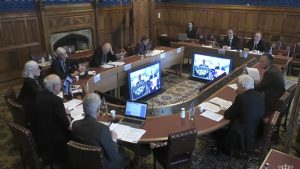
Stephen Gibson appeared before the Secondary Legislation Select Committee in his role as Chair of the Regulatory Policy Committee. He gave evidence on the quality of impact assessments and the how the Better Regulation Framework could be changed to improve the quality of the evidence and analysis underpinning government regulations and support better regulatory policy. A recording of Stephen’s evidence is available on Parliament TV.
4th April 2022 – Stephen Gibson interviewed on BBC Radio 5 about stamp price rises
 Stephen Gibson was interviewed by Sean Farrington on BBC Radio 5 about the 10p increase in the price of first class stamps from 85p to 95p. Stephen commented that this was not caused by increasing costs, but rather was due to the reduction in letter traffic volumes – down 60% since 2005 and 20% in the last 2 years.
Stephen Gibson was interviewed by Sean Farrington on BBC Radio 5 about the 10p increase in the price of first class stamps from 85p to 95p. Stephen commented that this was not caused by increasing costs, but rather was due to the reduction in letter traffic volumes – down 60% since 2005 and 20% in the last 2 years.
Stephen discussed how very few letters are sent by residential customers (generally only greetings and Christmas cards), most letters are sent by businesses such as banks and utility companies, but that even that volume had been falling away as companies move to emails and secured websites to communicate with their customers.
23rd March 2022 – Stephen Gibson appears before International Trade Select Committee
Stephen Gibson appeared before the International Trade Select Committee to give evidence about the Regulatory Policy Committee’s review of the Impact Assessments of the UK’s Free Trade Agreements with Australia and New Zealand. A recording of Stephen’s evidence is available on Parliament TV (scroll to 10:37:40).
21st February 2022 – Stephen Gibson quoted in Telegraph article
Stephen Gibson was quoted in an article about cutting red-tape in an article published in today’s Telegraph. The Telegraph quotes Stephen as saying that ‘a red tape drive should not be about “whether we have too much or too little regulation” but “whether the regulations are still fit for purpose“‘.
19th January 2022 – Stephen Gibson speaking at Hansard Society webinar
Stephen Gibson is speaking at a webinar organised by the Bingham Centre for the Rule of Law and the Hansard Society on ‘Parliamentary Scrutiny, Evidence and the Rule of Law’. This event will explore the role of evidence, impact assessments, explanatory memorandums and other related material in facilitating parliamentary scrutiny of government law-making by delegated legislation.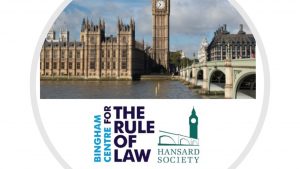
4th May 2021 – Stephen Gibson appointed Chair of the Regulatory Policy Committee
The Regulatory Policy Committee (RPC) assesses the quality of evidence and analysis used to inform regulatory proposals and verifies the costs that regulations place on business. It is an independent body sponsored by the Department for Business, Energy and Industrial Strategy.
Mr. Gibson’s appointment follows an open competition. He has held the role in an interim capacity since December 2019, having been a member of the committee since May 2018.
Business Secretary Kwasi Kwarteng said:
The UK is recognised worldwide as a great place to do business and further strengthening this reputation means keeping an eagle-eye on regulation to ensure the burdens on business are minimised.
Stephen brings a wealth of experience, energy and expertise to the role, and I’m delighted to appoint him as chairman as the committee continues its vital work in scrutinising the evidence and analysis underpinning regulatory decisions.
Regulatory Policy Committee Chair Stephen Gibson said:
I am honoured to have been offered this position. The Regulatory Policy Committee plays a key role in ensuring that new regulatory measures do not impose unjustified costs on business. I very much look forward to helping to ensure that UK regulation is supported by robust evidence and analysis as well as promoting transparency and accountability in the regulatory decision-making process.
Minister for Better Regulation Lord Callanan said:
The Regulatory Policy Committee offers important advice and scrutiny to government on regulatory change, ensuring we can effectively deliver policy while keeping the burdens on business to a minimum.
I am pleased to see Stephen appointed as chair. As an existing committee member, and recently as interim chair, he brings the vital experience and continuity the RPC needs to take forward its work in these exceptional times. I look forward to continuing to work with him on this important agenda.
18th March 2021 – Stephen Gibson’s work on ICCAN Expert Panel recognised in report
 ICCAN (the Independent Commission on Aircraft Noise) have published a report on the future of aviation noise management. In their report they recognise the contribution of economics and regulation expert Stephen Gibson in supporting their work.
ICCAN (the Independent Commission on Aircraft Noise) have published a report on the future of aviation noise management. In their report they recognise the contribution of economics and regulation expert Stephen Gibson in supporting their work.
9th March 2021 – Stephen Gibson appears before BEIS Select Committee
Stephen Gibson appeared before the Business, Energy and Industrial Strategy Select Committee in a pre-appointment hearing as the Government’s preferred candidate for Chair of the Regulatory Policy Committee. Stephen was questioned about his professional background, what he would bring to the the role, the current and potential future challenges faced by the RPC and his priorities as Chair. The Select Committee concluded that:
-
Mr Gibson demonstrated extensive relevant experience, a strong understanding of the challenges facing the RPC, as well as appropriate priorities for his proposed tenure.
-
Mr Gibson has the professional competence and personal independence required of the Chair of the RPC.
-
We are pleased to endorse Mr Gibson’s appointment and look forward to engaging with him during his tenure as Chair of RPC.
4th March 2021 – Secretary of State for Business announces Stephen Gibson as preferred candidate for Chair of the Regulatory Policy Committee
The Secretary of State for Business (The Rt Hon Kwasi Kwarteng) has announced that Stephen Gibson is the preferred candidate for the role of Chair of the Regulatory Policy Committee. Stephen has been the Interim Chair of the RPC for 15 months since December 2019 and will appear before the BEIS Select Committee for a pre-appointment hearing.
12th January 2021 – Stephen Gibson interviewed on Radio 5Live
Stephen Gibson was interviewed by Nihal Arthanayake and Danni Hewson on Radio 5Live about the challenges Royal Mail are facing and the delays to letters that customers are facing.
Stephen said that as a result of Covid Royal Mail faced a triple whammy from:
- the much higher absentee rates of around 30% in some areas,
- the fact that their operational processes are not designed for social distancing, and
- the increased volume of parcels as a result of more home shopping.
All of this meant that there was a real risk that NHS vaccine letters may be delayed and not get to people in time for their appointments. There is not much that Royal Mail can do to prioritise the vaccine letters and it is not clear how quickly Royal Mail will be able to clear the backlog.
5th November 2020 – Stephen Gibson appears before International Trade Select Committee
Stephen Gibson was invited to appear before the International Trade Select Committee regarding the RPC’s opinion on the UK-Japan Free Trade Agreement Impact Assessment. Stephen’s comments were referenced in the ITC’s report on the UK-Japan FTA.
28th October 2020 – Stephen Gibson appointed to ICCAN Expert Panel
Stephen Gibson has been appointed to the ICCAN (Independent Commission on Civil Aviation Noise) Expert Panel. ICCAN was established in 2019 with the aim of improving trust in the management of aviation noise. Stephen will advise ICCAN on the role of regulation in reducing aircraft noise.
26th October 2020 – Interview on BBC2 and BBC News Channel discussing Royal Mail’s plan to recruit 33,000 temporary workers
Stephen Gibson was interviewed on BBC2 and the BBC News Channel about Royal Mail’s plans to recruit 33,000 temporary postmen and postwomen over the Christmas period. He also discussed the Post Office’s plans to close 600 ATMs which are vital to securing access to cash in small towns and villages.
22 – 24 September 2020 – Stephen Gibson delivers Economic Regulation training course to the Utility Regulator Northern Ireland
Stephen Gibson delivered an online training course in regulatory economics to staff from the Utility Regulator Northern Ireland. Participants commented:
“He was very knowledgeable and personable, really knew his stuff!”
“All positive and good content!”
7th September 2020 – Stephen Gibson appointed as a visiting member of faculty by the Indian School of Competition Law & Market Regulation
Stephen Gibson has been appointed a visiting member of faculty by the Indian School of Competition Law and Market Regulation who are collaborating with the Forum of Indian Regulators to deliver an online course in Regulatory Governance.
This course gives an in-depth knowledge of the regulatory framework in India and best practices for regulatory governance. Stephen will deliver the module on Regulatory Impact Assessments.
3rd June 2020 – RegWatchEurope Board Meeting
Chair of the Regulatory Policy Committee, Stephen Gibson attended the RegWatchEurope (RWE) Board meeting which was held by video-conference. RWE is a group of European scrutiny bodies who work together to improve the regulatory scrutiny of government analysis. At the meeting we heard a presentation from the Danish Business Regulation Forum and agreed to the Danes request to join RWE.
26th May 2020 – Stephen gives Economics MSc lectures at Birkbeck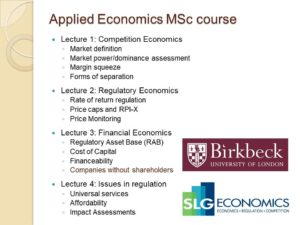 Stephen Gibson gave a series of 4 lectures to students at Birkbeck, University of London as part of their Masters course in Industrial Economics. The lectures covered:
Stephen Gibson gave a series of 4 lectures to students at Birkbeck, University of London as part of their Masters course in Industrial Economics. The lectures covered:
- Competition Economics – market definition, dominance assessment, margin squeeze and potential remedies;
- Regulatory Economics – RPI-X, Rate of return regulation, Price monitoring, opex and capex assessment, RPI vs CPI, performance incentives, universal services, affordability and regulating companies without shareholders;
- Financial Economics – CAPM, Weighted Average Cost of Capital, RAB/RCV and Financeabilty;
- Impact Assessments – best practice and case studies.
Unlike previous years, the lectures were delivered online over Birkbeck’s Collaborate platform. The lectures were recorded to allow students to review the material at a later date. Student feedback was excellent.
21st May 2020 – Stephen gives webinar to Forum of Indian Regulators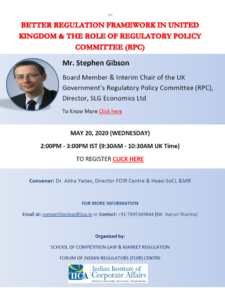 Stephen gave a webinar on Better Regulation in the UK and the Role of the RPC to the Forum of Indian Regulators (FOIR).
Stephen gave a webinar on Better Regulation in the UK and the Role of the RPC to the Forum of Indian Regulators (FOIR).
Dr. Abha Yadav, Director of FOIR thanked Stephen for his presentation which was the first of a series of webinars by eminent guest speakers that they are organising to create awareness of best practice across the globe. Further details are available here 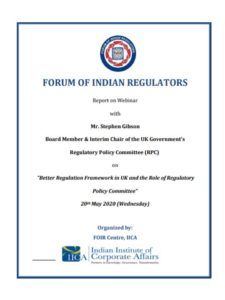 20th May 2020 – Stephen Gibson interviewed in Civil Service World
20th May 2020 – Stephen Gibson interviewed in Civil Service World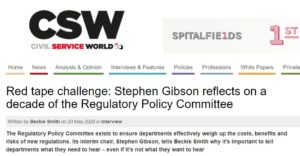
Stephen Gibson was interviewed in the Whitehall news bulletin, Civil Service World about his role as Interim Chair of the Regulatory Policy Committee and how the government could improve the way it makes regulatory policy.
In the interview Stephen discusses the important of high quality evidence and analysis underpinning government policy decisions:
“I’m an economist, I believe in evidence-based policy. When the evidence is less than good, it feeds through into the quality of the policy”
Read the full article here
18th May 2020 – Stephen confirmed as Interim Chair of the RPC
Stephen Gibson has been confirmed as interim chair of the Regulatory Policy Committee, having previously been a member of the committee since May 2018.

Business Minster, Lord Callanan said: “The Regulatory Policy Committee offers important advice and scrutiny to Government on regulatory change, ensuring we can effectively deliver policy, while keeping the burdens on business to a minimum.
“I am pleased to see Stephen appointed as interim chair. As an existing committee member, he brings the vital experience and continuity the RPC needs to take forward its work in these exceptional times.”
Interim chair of the Regulatory Policy Committee, Stephen Gibson said: “I am delighted to be appointed to this exciting role. It is more important than ever that we have better and more effective regulations that promote the interests of society including businesses, civil society organisations and the public. I look forward to working with government departments and regulators to improve the evidence and analysis underpinning their regulatory decisions.”
9th March 2020 – Stephen welcomes Lord Callanan to the RPC
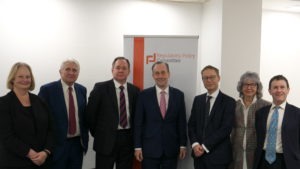 Stephen Gibson welcomed Lord Callanan, Under Secretary of State at BEIS to the RPC’s March meeting. They discussed ways of maximising the RPC’s value to Government and its commitment to better regulation.
Stephen Gibson welcomed Lord Callanan, Under Secretary of State at BEIS to the RPC’s March meeting. They discussed ways of maximising the RPC’s value to Government and its commitment to better regulation.
23rd January 2020 – Stephen speaks at House of Lords reception
 Stephen Gibson gave a speech in the House of Lords at the 10th anniversary of the Regulatory Policy Committee. Stephen’s speech recognised the RPC’s achievements over the last decade and laid the foundations for an ambitious programme to increase its effectiveness as an independent regulatory scrutiny body and Centre of Excellence going forward.
Stephen Gibson gave a speech in the House of Lords at the 10th anniversary of the Regulatory Policy Committee. Stephen’s speech recognised the RPC’s achievements over the last decade and laid the foundations for an ambitious programme to increase its effectiveness as an independent regulatory scrutiny body and Centre of Excellence going forward.
The full text of the speech has been published on the RPC’s website.
15th-16th January 2020 – Economic Regulation training course for Ofwat
Stephen Gibson ran a two day training course on regulatory economics for the water regulator, Ofwat. The course covered: the history of economic regulation, market definition and dominance assessment, how regulators set price controls, the cost of capital, design of incentive regimes, benchmarking and assessing efficiency, regulating companies without shareholders, regulating non-commercial services (eg the USO) and impact assessments.
If you would like further details about training in regulatory and competition economics, please contact Stephen@SLG-Economics.co.uk.
3rd-4th December – Stephen at RegWatchEurope Board meeting
![]()
Stephen Gibson attended the RegWatchEurope (RWE) Board meeting in Helsinki as Chair of the Regulatory Policy Committee. RWE is a group of 7 European scrutiny bodies who work together to ensure that the regulatory scrutiny of government analysis in Germany, Norway, Sweden, the Netherlands, the Czech Republic and the UK is of the highest standard.
1st November 2019 – Stephen appointed Interim Chair of the RPC
Stephen Gibson has been appointed Interim Chair of the Regulatory Policy Committee (RPC).
The RPC assesses the quality of evidence and analysis used to inform regulatory proposals affecting the economy. Its independent advice and scrutiny helps ensure that ministerial policy decisions are based on accurate evidence and helps to produce better regulation. It provides advice on the estimated costs or savings of new regulations to help to inform decisions on whether or not proposals should be taken forward.
The RPC committee consists of independent experts from a range of backgrounds, including the private and voluntary sectors, economics, business, the legal profession, and academia. Stephen will be chairing the committee on an interim basis while the previous chair is standing as a prospective parliamentary candidate in the forthcoming national election.
October 2019 – RPC opinion on the EU Withdrawal Agreement Bill
Stephen led the Regulatory Policy Committee’s work scrutinising the Impact Assessment of the EU Withdrawal Bill published by the Department for Exiting the EU (DExEU). The RPC opinion is available here. The RPC took the unusual decision not to rate the IA either green (fit for purpose) or red (not fit for purpose) and instead issued an unrated opinion in recognition of the unique circumstances that prevented the Department from producing a more substantive impact assessment of all aspects of the Bill.
The RPC’s opinion was highlighted in an open letter from the Opposition Chief Whip to the Government Chief Whip
26 September 2019 – Opinion Piece published by Institute of Economic Affairs (IEA)
Stephen Gibson has had an opinion piece that he authored published by the Institute of Economic Affairs. Stephen’s article criticises a paper published in BMJ Open regarding Ofcom’s decision in 2007 to regulate the advertising on TV of food that is high in fat, salt and sugar. The BMJ Open paper contained a large number of significant factual errors and failed to appreciate the basis on which public policy decisions are made by economic regulators like Ofcom – as a result it came to a conclusion that was “both erroneous and misleading“.
Stephen has a special insight into the evidence and reasoning that led to the Ofcom decision since he was the Principal Economist at Ofcom between 2004 and 2007 and was responsible for leading their Impact Assessment of Television Advertising Restrictions of Food and Drink Products to Children. Stephen’s article is also available here.
24 and 26 June 2019 – Economic Regulation training course for DfT
Stephen Gibson ran a two day training course on regulatory economics for the Department for Transport. The course covered: the history of economic regulation, market definition and dominance assessment, how regulators set price controls, the cost of capital, design of incentive regimes, benchmarking and assessing efficiency, regulating companies without shareholders, regulating non-commercial services (eg the USO) and impact assessments.
The course was extremely well received, comments from delegates included:
“I think the course has been brilliant”
“The course was fascinating and incredibly detailed”
“Really excellent – essential & fantastic … thank you for answering all my questions”
“I got a huge amount out of this course and really enjoyed it”
If you would like further details about training in regulatory and competition economics, please contact Stephen@SLG-Economics.co.uk.
25 June 2019 – Bowel Cancer UK Scientific Panel
Stephen Gibson attended Bowel Cancer UK’s scientific panel as a representative from the BCUK Lay Panel helping to review and evaluate research proposals that might help bowel cancer patients and those at risk from the disease. Stephen has previously been a Trustee and Deputy Chairman of BCUK and stood down at the end of 2017 to support the merger with Beating Bowel Cancer. He is delighted to be able to help the charity in this new role.
9-23 May 2019 – Lectures in Industrial Economics at Birkbeck, University of London
 Stephen Gibson gave a series of lectures at Birkbeck on their MSc in Industrial Economics. The lectures covered:
Stephen Gibson gave a series of lectures at Birkbeck on their MSc in Industrial Economics. The lectures covered:
- Competition Economics – market definition, dominance assessment and potential remedies;
- Regulatory Economics – RPI-X, Rate of Return Regulation, Price Monitoring, Opex and Capex assessment, RPI vs CPI, performance incentives and universal services;
- Financial Economics – CAPM, Weighted Average Cost of Capital, RAB/RCV, Financeabilty; and
- Impact Assessments – best practice and case studies.
Student feedback included:
“I want to thank you for your classes, as I really enjoyed
them and I thought the material was excellent“
“I just wanted to drop you an email thanking you again for
your lectures. I’ve found both the course content and
your teaching style quite excellent!“
For information about lectures or training courses in regulatory or competition economics, please contact: Stephen@SLG-Economics.co.uk
1 March 2019 – Interview on Radio 5 Wake Up To Money about Britbox
 Stephen Gibson was interviewed by Sean Farrington and Micky Clark on Radio 5’s Wake Up To Money about the regulatory implications of the BBC and ITV’s new Britbox streaming service. This will allow subscribers in the UK to view the broadcasters’ huge back catalogue of programmes. Stephen said that the position is very different from the previous proposal (code-named ‘Kangeroo’) put forward by BBC, ITV and Channel 4 in 2008-09. Kangeroo was rejected by the Competition Commission because of concerns that it would damage the position of other players in the market like Netflix and Amazon Video which were at the time just starting up. In this case the key question is whether Britbox will survive in the market given the much stronger position of competitors today. He thought that regulatory approval of Britbox would not be a problem, and that its revenues would help to fund public service broadcasting and take some of the pressure off the licence fee. Use the link below to listen to the interview
Stephen Gibson was interviewed by Sean Farrington and Micky Clark on Radio 5’s Wake Up To Money about the regulatory implications of the BBC and ITV’s new Britbox streaming service. This will allow subscribers in the UK to view the broadcasters’ huge back catalogue of programmes. Stephen said that the position is very different from the previous proposal (code-named ‘Kangeroo’) put forward by BBC, ITV and Channel 4 in 2008-09. Kangeroo was rejected by the Competition Commission because of concerns that it would damage the position of other players in the market like Netflix and Amazon Video which were at the time just starting up. In this case the key question is whether Britbox will survive in the market given the much stronger position of competitors today. He thought that regulatory approval of Britbox would not be a problem, and that its revenues would help to fund public service broadcasting and take some of the pressure off the licence fee. Use the link below to listen to the interview
1 March 2019 – Stephen Gibson appointed to the CAA’s Senior Advisory Panel
 Stephen Gibson has been appointed to the CAA’s Senior Advisory Panel overseeing and challenging the development of the regulatory framework for Heathrow. Stephen is one of four experts who have been chosen to advise on key policy decisions surrounding the regulation and expansion of Heathrow Airport.
Stephen Gibson has been appointed to the CAA’s Senior Advisory Panel overseeing and challenging the development of the regulatory framework for Heathrow. Stephen is one of four experts who have been chosen to advise on key policy decisions surrounding the regulation and expansion of Heathrow Airport.
30 January 2019 – Stephen Gibson attends reception for Bowel Cancer UK in House of Commons
Stephen Gibson attended a Parliamentary Reception at the House of Commons in support of Bowel Cancer UK (BCUK). Step hen who is on BCUK’s Lay Panel and a former Trustee of the charity said that it was a fantastic event with charity supporters, staff, clinicians and Parliamentarians all privileged to hear from Nic Dakin MP, Chair of the All-Party Parliamentary Group on Cancer, Steve Brine MP, Minister for Cancer, Deborah Alsina, CEO of BCUK and Lauren Backler who gave a passionate speech about her campaign to lower the age of screening for bowel cancer from 60 to 50
hen who is on BCUK’s Lay Panel and a former Trustee of the charity said that it was a fantastic event with charity supporters, staff, clinicians and Parliamentarians all privileged to hear from Nic Dakin MP, Chair of the All-Party Parliamentary Group on Cancer, Steve Brine MP, Minister for Cancer, Deborah Alsina, CEO of BCUK and Lauren Backler who gave a passionate speech about her campaign to lower the age of screening for bowel cancer from 60 to 50
12 December 2018 – Stephen Gibson interviewed by Evan Davis on BBC’s PM programme
